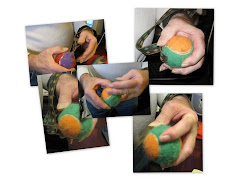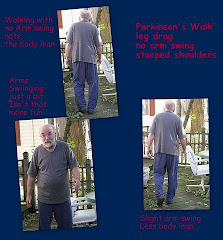 I noticed I was losing my sense of smell before I realized I had the symptoms of Parkinson's disease. For many PD patients that loss is their first inkling that something is wrong. Over 20 million people suffer from loss of sense of smell in the US. It can be caused by allergies, viral infections or chronic neurological conditions such as Multiple Sclerosis, Alzheimer's or Parkinson's disease.
I noticed I was losing my sense of smell before I realized I had the symptoms of Parkinson's disease. For many PD patients that loss is their first inkling that something is wrong. Over 20 million people suffer from loss of sense of smell in the US. It can be caused by allergies, viral infections or chronic neurological conditions such as Multiple Sclerosis, Alzheimer's or Parkinson's disease. The sense of smell is part of our chemical sensing system.
 Sensory cells in our noses, mouths and throats help us interpret smells and the favors of food and drink. Microscopic molecules released by the plants and foods around us stimulate these sensor cells to signal the brain which is where scents are identified.
Sensory cells in our noses, mouths and throats help us interpret smells and the favors of food and drink. Microscopic molecules released by the plants and foods around us stimulate these sensor cells to signal the brain which is where scents are identified. The loss of the ability to smell can be dangerous. We are warned of a fire by the smell of smoke. Smell is often the first warning of a natural gas or propane leak. More important is that the loss of sense of smell is a warning of impending health problems: obesity, diabetes, hypertension, malnutrition, Parkinson's, MS, Alzheimer's can all be signaled by the loss or partial loss of the sense of smell.
It's been 10 or 15 years since I have been able to sense smells normally. I seem to be lucky that I can still taste foods with my mouth and throat aided by freshly ground red or black pepper or curry powder. Mostly I try not to agonize over my lost senses. I think the best answer is to try developing a love for remaining senses.
Some people can be treated successfully. A drug interaction could be the cause of olfactory loss might be correctable. Changing a medicine might work or for some a spontaneous recovery might be caused by the regeneration of the olfactory neurons. I tried zinc ascorbate last month and it did restore some slight ability to taste and smell but my wife took it away from me after 30 days telling me that I would have to wait a month or so before using it again for 30 days.
Some people have found that by taking theophylline, a broncodilator to relax smooth muscle
 contraction, they have regained their sense of smell. This is not recommendation, it is an observation indicating that there will be safer pathways developed.
contraction, they have regained their sense of smell. This is not recommendation, it is an observation indicating that there will be safer pathways developed.Olfactory research is going on at universities and medical centers across the US. Some research is showing scientists how the parts of the olfactory system which sense and identify smells interact with other physical and neurological parts of the olfactory system.
Perhaps, as the result of treatments developed in the next few years, I will be able to sit with my wife and savour a meal that I will remember the rest of my life, like the one in Montreal 40 years ago that I'm remembering now.
Addendum 2010
Refer a friend or relative to the PARS - Parkinson Associated Risk Study.
Although the study initially wanted people with first-degree relatives, they soon found that it didn't make a difference if the person was a relative of a PWP or not. While they prefer people over 60 years of age, people with a family member with PD may be eligible if under 60.
The goal is to study early warning signs. We all know that early diagnosis means that treatment can be initiated sooner. Now that we know there is more than one treatment or therapy which might slow progression, early diagnosis becomes more imperative.
Addendum 11/2015
New Parkinson's disease diagnostics are being developed by a 4 continent task force, the International Parkinson and Movement Disorder Society (MDS) task force.
According to a Foxfeed blog entry posted by Maggie McGuire Kuhl on 11/23/2015, Dr Robert B Postuma of Montreal General Hospital had this to say about using loss of sense of smell in both diagnosis and in differential diagnosis.
It’s a supportive criterion because we know that 80 percent of Parkinson’s patients have lost their sense of smell. And up to 80 percent of people who have alternate causes (PSP, MSA, essential or dystonic tremor) have normal smell.














every now and then you can get a whiff of something wonderful...cookies in the oven, a cologne, a rose, and ah my favorite fresh brewed coffee....wonder if these are phantom smells left in the midst of our memories....We don't realize how not only important but wonderful the sense of smell is until it is gone...
ReplyDeleteDid you ever catch a scent in the air which took you back to another place or person in your past?
ReplyDeleteYou are so right about the cookies baking, the perfume, the smell of a just-bathed baby...
If I didn't have a good sense of smell, I'd burn a lot more when I cook.
I was going to suggest zinc! I know there's a balance between it and copper, to be mindful. How many PD patients get their zinc/copper levels checked?!
ReplyDeleteNamaste.